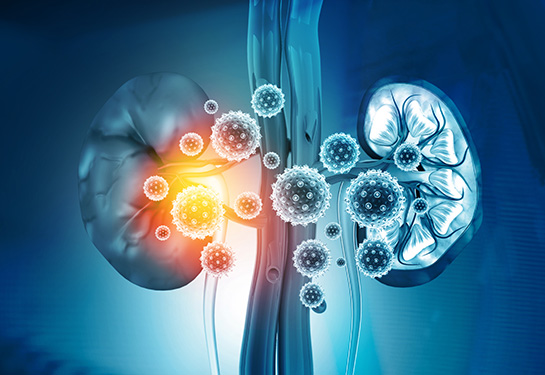Research shows COVID-19 is not strongly linked to long-term loss of kidney function
Studies have shown a significant portion of hospitalized patients with COVID-19 infection experience acute kidney injury (AKI) and other kidney abnormalities. However, a retrospective cohort study by UC Davis Health researchers shows COVID-19 is not strongly linked to long-term loss of kidney function.
“Early in the COVID-19 pandemic, kidney abnormalities were often recognized in patients with COVID-19,” said Hiba A.M. Hamdan, the principal investigator of the study and health sciences assistant clinical professor in the Division of Nephrology. “Given how infectious COVID-19 was and the large numbers of individuals being hospitalized with the virus, it was imperative we better understand the short and longer-term kidney sequelae of COVID-19 infection so we could prepare if we saw a significant uptick in the incidence of chronic kidney disease.”
During the first year of the pandemic, studies showed that over a quarter of patients hospitalized with COVID-19 developed AKI. Also known as acute renal failure, AKI is a sudden episode of kidney failure or kidney damage that happens within a few hours or a few days. There were also reports of sustained long-term loss of kidney function after COVID-19, although the follow up periods were not very long.
Given how infectious COVID-19 was and the large numbers of individuals being hospitalized with the virus, it was imperative we better understand the short and longer-term kidney sequelae of COVID-19 infection so we could prepare if we saw a significant uptick in the incidence of chronic kidney disease at all stages.” —Hiba A.M. Hamdan
To examine if COVID-19 led to long-term kidney issues in hospitalized patients, researchers conducted an analysis of electronic health record data from adults receiving care in the University of California (UC) Health System, which is comprised of six medical centers. They looked at:
- Patients who underwent PCR testing and were positive for SARS-CoV-2 between March 1, 2020, and Dec. 31, 2021
- Patients hospitalized within 10 days of testing
- Patients hospitalized for at least one day
- Patients who were not diagnosed with end-stage renal disease
- Patients who were not pregnant
In total, the AKI inpatient cohort included 5,451 individuals with COVID-19. Patients had an average age of 59 years, were 59% percent male and 45% Hispanic. The rate of patients with COVID-19 that experienced AKI ranged from 20-38% and varied over the course of the period reviewed.
To determine the long-term kidney function of the cohort, researchers measured the estimated glomerular filtration rate (eGFR) trajectories in those with COVID-19 and in a separate cohort who experienced AKI without COVID-19. Researchers followed the patients through Dec. 31, 2022, and concluded there was no significant difference in eGFR loss between the groups over the approximately two years of follow-up.
Similar findings were also noted in a very large cohort that examined long term effects of COVID-19 on kidney function, in patients who didn’t have a hospitalization event detected within 10 days after the initial SARS-COV 2 PCR testing.
“This study has important implications because we examined a very diverse cohort from one of the largest healthcare systems in California and had one of the longest reported follow-up periods of kidney function following COVID-19 infection,” explained Hamdan. “Our hope is that these findings help guide our healthcare system and others in planning for post COVID-19 care.” This also has implications for other respiratory viruses and how they can impact kidney function.
In addition to Hamdan, research co-authors included Brian Paciotti, data systems manager; Blythe Durbin-Johnson, principal statistician of biostatistics; Juan Pablo Moreno Ortiz, fellow of nephrology; Brian Young, professor of nephology; and Baback Roshanravan, associate professor of nephrology.







